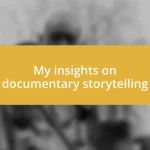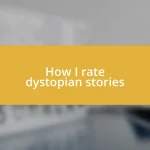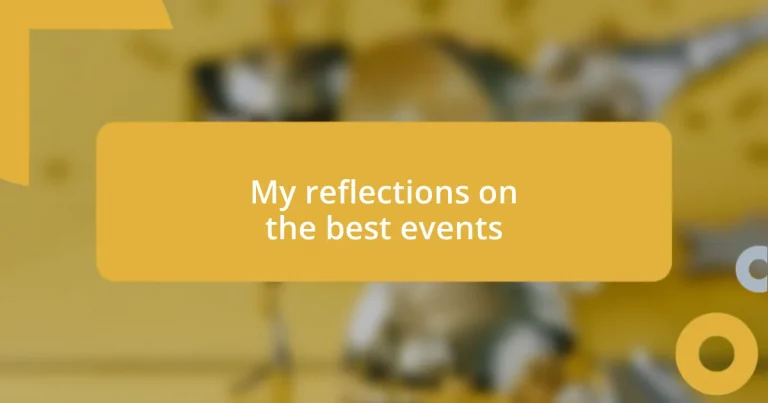Key takeaways:
- Events create connections and foster a sense of belonging, reflecting cultural diversity and collective experiences.
- Reflecting on events enhances understanding, identifies areas for growth, and deepens appreciation for shared experiences.
- Successful event evaluation includes criteria such as engagement, organization, accessibility, and the importance of following up on connections made.
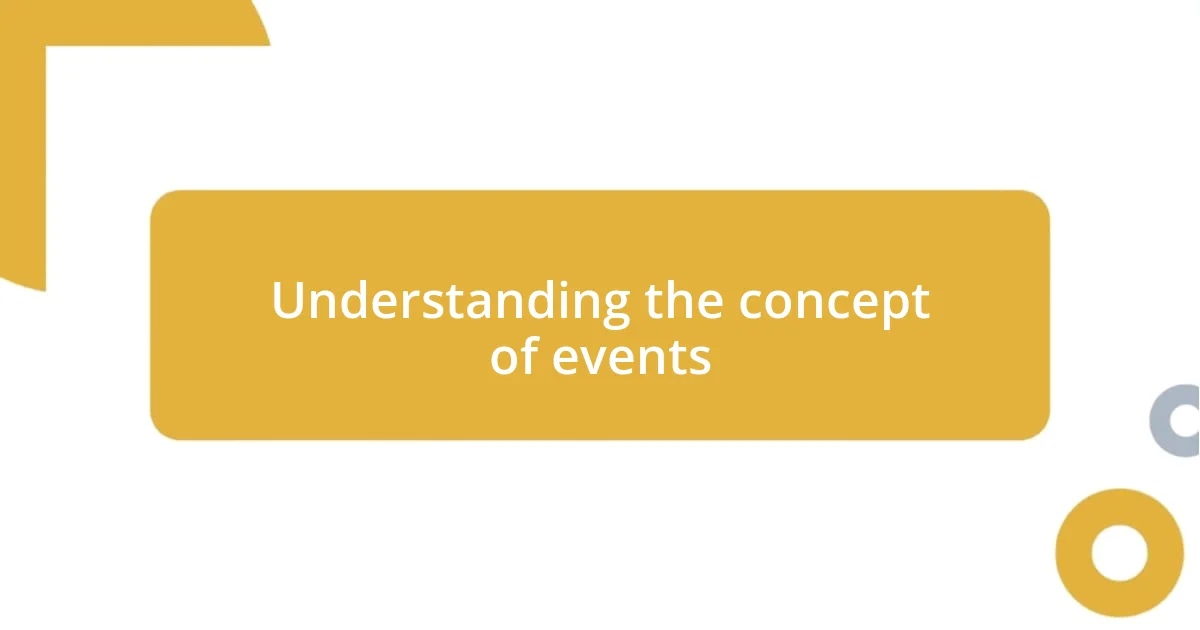
Understanding the concept of events
Events, at their core, are moments or occasions that bring people together, often around a shared experience or purpose. I remember the first time I attended a community festival; the air was filled with laughter and excitement, and it struck me how events can create an instant sense of belonging. Have you ever found yourself surrounded by strangers, yet feeling so connected? That’s the magic of events—they bridge gaps and foster relationships.
When I think about the diversity of events, I can’t help but appreciate how they range from grand celebrations to intimate gatherings. Each one serves a purpose, whether it’s to commemorate, educate, or entertain. For instance, attending a friend’s wedding not only celebrated their love but also allowed me to reconnect with old friends in a joyous setting. What is it about weddings that feel so universally touching? Perhaps it’s witnessing love in its purest form amid a sea of smiles and shared moments.
Events also reflect cultural and social dimensions that vary from community to community. I’ve participated in cultural parades that celebrate heritage, which taught me about the rich tapestry of traditions around us. That realization made me ponder: how can we ensure we honor diversity in our events? It’s apparent that understanding this concept means not just seeing events as mere gatherings, but as meaningful expressions of who we are collectively.
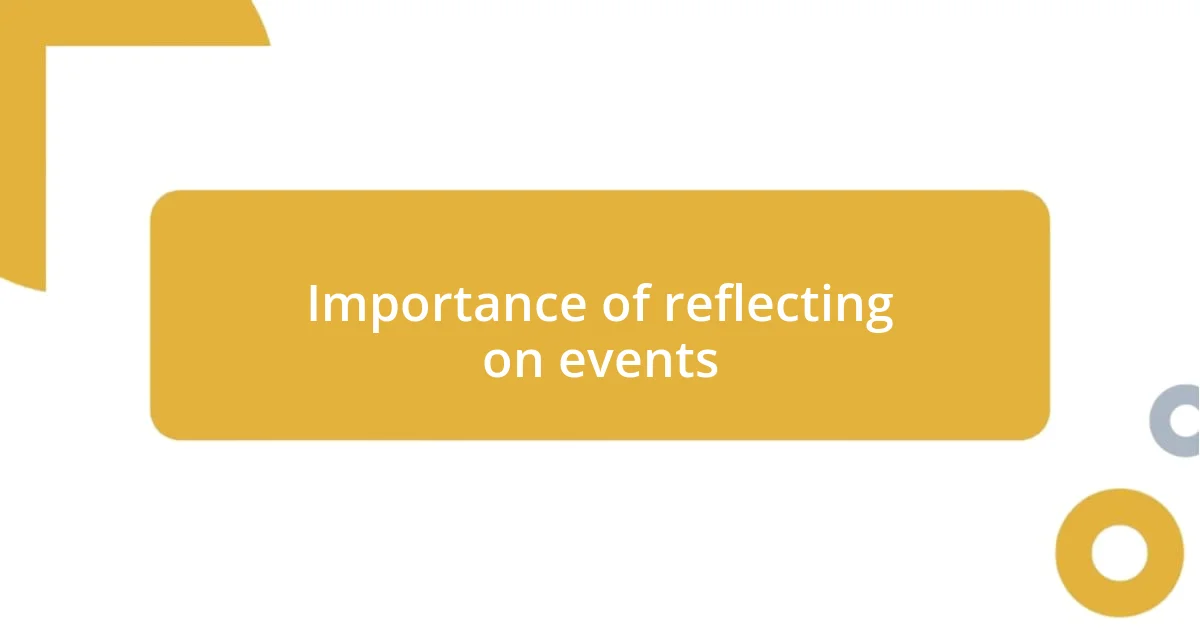
Importance of reflecting on events
Reflecting on events holds significant value as it allows us to distill lessons and insights from our experiences. I often find myself revisiting fond memories, like that time I participated in a local charity run. The energy of the crowd and the collective purpose behind supporting a good cause left an indelible mark on me. Have you ever thought about how sharing a goal with others can transform an experience? It’s these reflections that deepen my understanding of my motivations and aspirations.
Taking the time to reflect not only helps in recognizing what was enjoyable, but it also highlights areas for improvement. I remember attending a workshop that, while informative, felt a bit disorganized. Reflecting on why that was the case allowed me to understand the importance of coherent structure in learning environments. It prompted me to think about how crucial organization is in delivering content effectively—something I now try to incorporate when I lead discussions.
Additionally, reflection fosters gratitude and appreciation for the experiences we’ve shared. After attending a moving concert, I felt compelled to analyze why the music resonated so deeply with me. It wasn’t merely the performance but also the shared energy with other concert-goers that made it special. This perspective has encouraged me to seek deeper connections in future events. Isn’t it fascinating how reflecting on an event can open us up to new possibilities and viewpoints?
| Reasons for Reflection | Personal Insights |
|---|---|
| Deepens understanding of experiences | Prevents overlooking meaningful moments |
| Identifies areas for growth | Shows us how we can improve future events |
| Enhances appreciation for connections | Reminds us of the value in shared experiences |
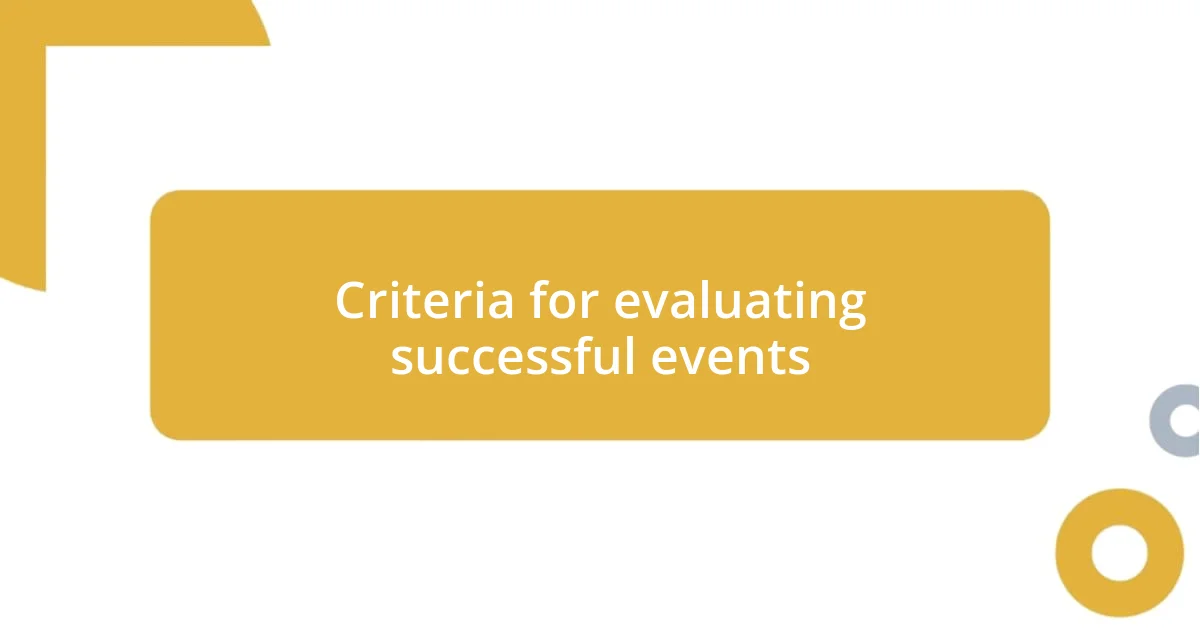
Criteria for evaluating successful events
Evaluating the success of an event can often feel subjective, but I believe there are key criteria that offer a solid framework. For me, the atmosphere plays a critical role; it’s that indescribable energy that envelops everyone and creates a sense of connection. I still recall the vibrant buzz at a local art show, where the excitement of the attendees mingled with the creative energy of the pieces on display. It made the experience not just enjoyable, but memorable.
To give a more structured view, here’s a list of essential criteria I consider when evaluating an event:
- Engagement: Did the audience actively participate and express enthusiasm?
- Organization: Was the event well-planned, with clear communication and smooth operations?
- Accessibility: Were the venue and content accessible to everyone, encouraging inclusivity?
- Relevance: Did the event resonate with its purpose and the interests of attendees?
- Feedback: Was there a mechanism for attendees to share their thoughts and experiences afterward?
These factors collectively contribute to the overall impression of an event, guiding both future planning and personal enjoyment. As I reflect on various events I’ve attended, it’s clear that achieving a balance among them can lead to richer experiences for everyone involved.
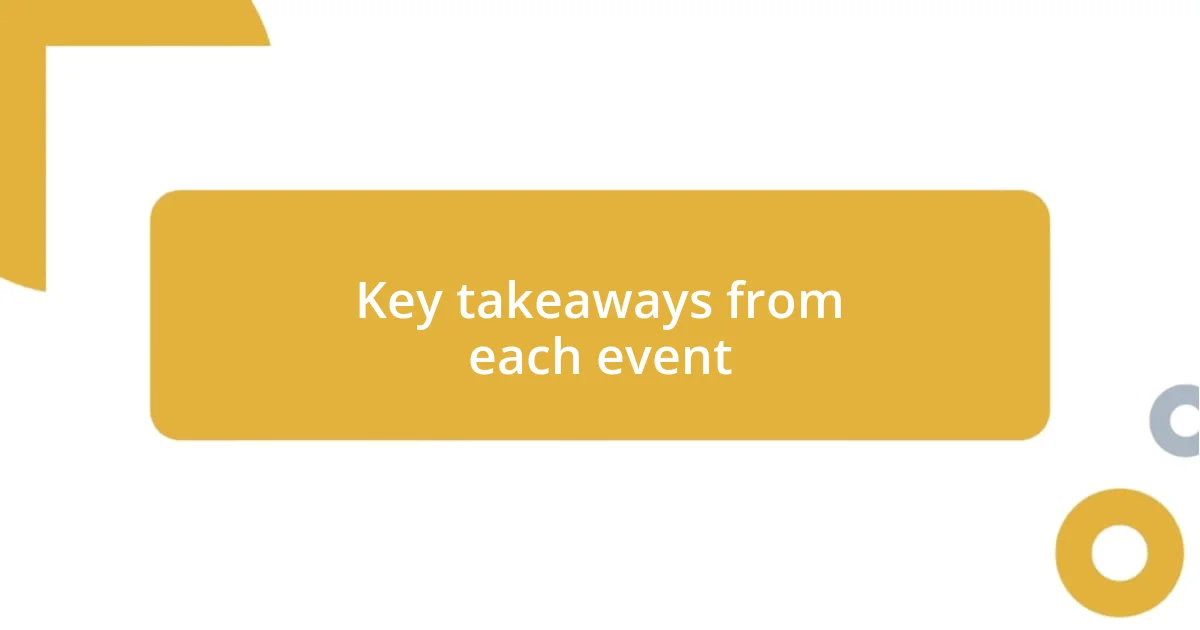
Key takeaways from each event
Reflecting on key takeaways from each event truly enriches my understanding of what makes experiences worthwhile. For instance, I once attended a leadership conference where the keynote speaker shared personal stories of failure along with triumphs. It struck me how vulnerability can foster authenticity in leadership. Have you ever considered how being open about our struggles can create a stronger bond with others? I left that event inspired, with a new appreciation for the importance of honest communication.
Another memorable occasion was a community potluck where people from diverse backgrounds came together to share food and stories. The sense of unity was palpable; it reminded me of how communal experiences nurture relationships. I realized the power of food as a universal language that breaks down barriers. Isn’t it interesting how something as simple as sharing a meal can lead to profound connections? That event reinforced my commitment to seek inclusivity in all gatherings I organize.
Lastly, during a recent networking event, I learned the importance of follow-up. Although the initial conversations were engaging, I noticed that many connections faded once people returned to their routines. This experience emphasized to me that relationships require nurturing even after the event ends. How many opportunities do we miss because we don’t maintain those early sparks of connection? It’s a reminder that the real work often begins after the event, and I now prioritize checking in with new acquaintances to cultivate lasting relationships.
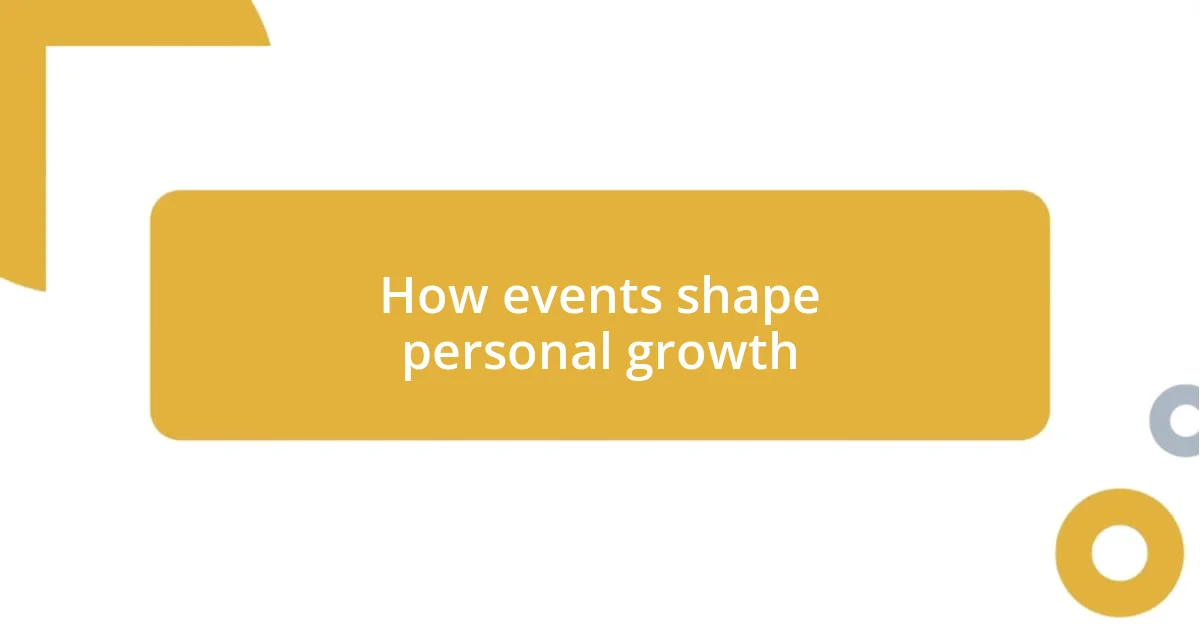
How events shape personal growth
Experiencing events is like a journey that profoundly shapes who we are. I remember attending a wellness retreat that was transformative for me. The workshops on mindfulness pushed me to explore my inner thoughts and feelings, leading to an epiphany about how I cope with stress. Have you ever had a moment where everything just clicks into place? Those few days ignited a desire in me to incorporate mindfulness practices into my daily life, demonstrating how events can act as catalysts for personal change.
Another instance was a volunteer event I participated in, where we helped refurbish a local community center. Working side by side with strangers, I felt an overwhelming sense of purpose and community spirit. It made me reflect on how stepping outside my comfort zone can lead to rewarding experiences that foster growth. Isn’t it incredible how a commitment to serve others can also uplift our own spirits? I walked away not just proud of the work we did but also with a renewed sense of connection to my community.
Finally, I once attended a conference focused on innovation in technology that challenged my preconceived notions. Listening to diverse perspectives opened my eyes to the myriad ways in which technology can be harnessed for good. Our discussions sparked a curiosity in me to delve deeper into areas I had previously overlooked. It’s fascinating how a single event can expand our horizons and encourage us to think critically. Have you ever left an event feeling like your mind was blown wide open? Those moments remind me that growth often stems from stepping into new territories—both mentally and emotionally.
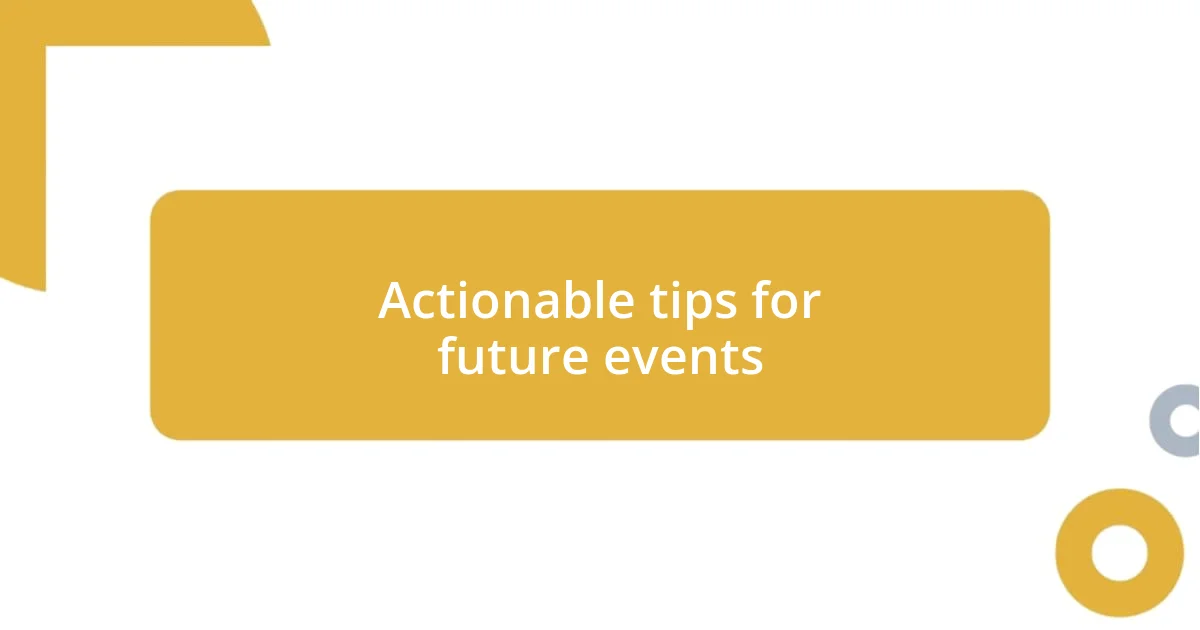
Actionable tips for future events
I’ve learned that careful planning and attention to detail can significantly enhance any event. For example, I once coordinated a workshop where I made sure to include interactive elements. This not only kept the participants engaged but also sparked lively discussions that I hadn’t anticipated. Have you ever seen how a well-timed icebreaker can change the atmosphere? It’s all about creating a space where everyone feels comfortable participating.
Another crucial lesson I took away was the importance of keeping lines of communication clear before, during, and after an event. I can recall a time when I neglected to send timely reminders for an important seminar, which resulted in half the expected attendees missing out. It made me realize how essential it is to ensure everyone is on the same page. How much could we improve participation if we just communicated better? Now, I prioritize sending out multiple reminders and providing clear agendas, making sure everyone feels informed and included.
Lastly, I’ve discovered that feedback can be a game-changer for future events. After hosting a neighborhood gathering, I took the initiative to send out a simple survey asking attendees what they enjoyed and what could be improved. The responses were enlightening and highlighted aspects I hadn’t even considered. How often do we miss out on valuable insights because we don’t ask for them? I’ve since made it a habit to incorporate feedback sessions, allowing me to continually enhance the experiences I create while expressing to attendees that their opinions truly matter.
